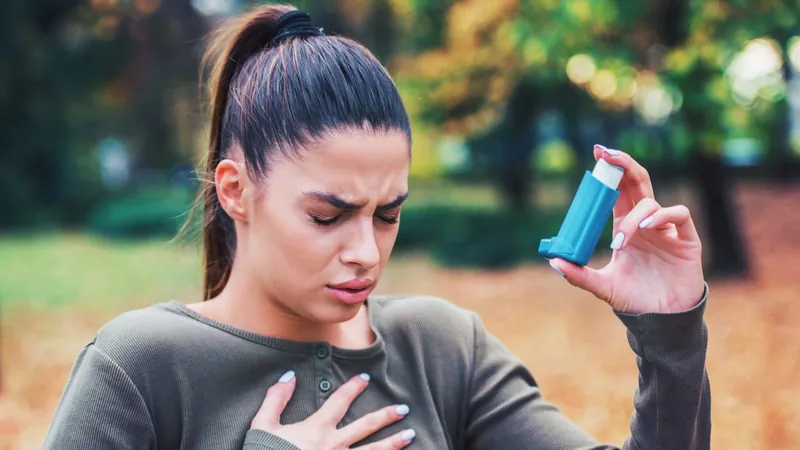
Struggling to Breathe? It Might Be Time to Consider Air Pollution's Role in Your Asthma
2024-11-24
Author: Rajesh
What Is Asthma?
Asthma is a prevalent respiratory condition characterized by breathing difficulties. It occurs when the airways in the lungs become inflamed, leading to a constricted airflow that makes breathing laborious. Individuals suffering from asthma often experience wheezing (a whistling sound when breathing), shortness of breath, persistent coughing, and a feeling of tightness in the chest. These symptoms can be triggered by a myriad of factors, including allergens, air pollution, cold air, and even intense physical activity. Although asthma can develop at any age, it is particularly common in children, whose immune systems are still maturing.
The Connection Between Air Pollution and Asthma
If you have asthma, you're likely aware of how easily your lungs can be triggered. Air pollution is one of the culprits that can lead to a worsening of asthma symptoms. Substances like smoke, dust, and vehicle emissions are primary airborne irritants that can exacerbate your condition. When the air quality deteriorates, these pollutants can inflame and irritate the airways, leading to historical wheezing, persistent coughs, and distressing breathing difficulties. A significant study published in the journal *Lancet* highlights the severe impact of air pollution. Elevated levels of pollutants, particularly from automobile exhaust, can cause airway inflammation and trigger asthma attacks. Moreover, these pollutants induce oxidative stress, damaging lung tissues and worsening asthma symptoms. Tiny particles inhaled from polluted air can constrict the muscles surrounding the airways, making it increasingly challenging to breathe effectively.
Can Air Pollution Cause Asthma?
Surprisingly, air pollution doesn't just worsen asthma; it can also contribute to its onset. A comprehensive review published in the *International Journal of Environmental Research and Public Health* indicates that both indoor and outdoor air pollutants can significantly influence the likelihood of developing asthma, especially among genetically predisposed individuals. Essentially, for those at risk, exposure to polluted air can act as a trigger for developing this chronic condition. The implications of air pollution on health extend beyond adulthood. Research documented in *Environmental Health* shows that pregnant women exposed to traffic pollution can increase the likelihood of their children developing asthma. Furthermore, children raised in high-pollution areas face a greater risk of having asthma, a threat that often persists into their early adult years. A compelling study in the *European Respiratory Journal* documents a link between early exposure to polluted air and enduring asthma symptoms. In summary, the relationship between air pollution and asthma is intricate and alarming, with lasting impacts on health.
How to Protect Yourself from Air Pollution and Asthma
Here are ten practical tips to minimize your risk of having an asthma attack during periods of high pollution: 1. **Stay Indoors**: On days marked by high pollution levels, limit your time outside. 2. **Stay Informed**: Utilize local air quality apps or websites to monitor pollution levels. 3. **Seal Your Home**: Keep windows closed on polluted days to avoid indoor contamination. 4. **Air Purifiers**: Invest in air purifiers that can filter out harmful particles in your home environment. 5. **Outdoor Exercise**: Avoid exercising outdoors, particularly during mornings or late afternoons when pollution peaks. 6. **Wear Protective Gear**: If you must venture outside, consider wearing an N95 mask to filter out pollutants. 7. **No Smoking Indoors**: Eliminate smoke exposure; both active and passive smoking contribute to respiratory issues. 8. **Clean Regularly**: Regular dusting and vacuuming can help reduce allergens that may trigger asthma during pollution spikes. 9. **Sinus Care**: Use a saline rinse to clear out pollutants from your sinuses and consider steam inhalation to soothe your airways. 10. **Always Be Prepared**: Carry your inhaler or prescribed asthma medication wherever you go and adhere to your healthcare provider’s advice. Arming yourself with these strategies may help shield you from the detrimental effects of air pollution on asthma, promoting a healthier lifestyle amid challenging environmental conditions.


 Brasil (PT)
Brasil (PT)
 Canada (EN)
Canada (EN)
 Chile (ES)
Chile (ES)
 España (ES)
España (ES)
 France (FR)
France (FR)
 Hong Kong (EN)
Hong Kong (EN)
 Italia (IT)
Italia (IT)
 日本 (JA)
日本 (JA)
 Magyarország (HU)
Magyarország (HU)
 Norge (NO)
Norge (NO)
 Polska (PL)
Polska (PL)
 Schweiz (DE)
Schweiz (DE)
 Singapore (EN)
Singapore (EN)
 Sverige (SV)
Sverige (SV)
 Suomi (FI)
Suomi (FI)
 Türkiye (TR)
Türkiye (TR)